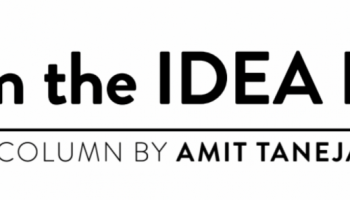Guest Column: Michelle D. Boone

“Work-life balance” is the refrain of our time — an idea that feels out of reach most days, but if nothing else, it is something to aim toward. We reorganize our lives in attempt to achieve it: cutting activities out or splicing activities in. Maybe some people achieve balance, but for many of us, the struggle persists.
This week at Chautauqua Institution, we will consider “A Planet in Balance” and what our human role is in determining the uncertain fate of biodiversity. In this planetary work-life balance, the existence of the 5 to 10 million species that share the planet with us is often at odds with human needs. The irony, of course, is that human needs and wants — for our food, homes and clothing, medicines, energy, water filtration, climate regulation, crop pollination, recreation and even spiritual well-being — are reliant on natural systems. Determining the ecological place of humans in the natural world is perhaps the central question of our time at this critical moment in our evolutionary history. How we answer this question will have consequences for all species on earth, including ourselves.
When Aldo Leopold’s pivotal work A Sand County Almanac: And Sketches Here and There was published in 1949, it was intended to offer us his perspective on how our species might live.
Leopold wrote, “We abuse land because we regard it as a commodity belonging to us. When we see land as a community to which we belong, we may begin to use it with love and respect.”
Leopold saw us not as a species outside of the community but a member-citizen who could, with a land ethic — a “conviction of individual responsibility for the health of the land” — preserve the integrity of the ecological community. In his book, we see a man who spent his lifetime in the woods and fields and at the water’s edge, often hunting but always observing with ears pricked as a thoughtful member of the food web.
Yet in his writing, Leopold grieves the places he has been: “It is the part of wisdom never to revisit a wilderness, for the more golden the lily, the more certain that someone has gilded it.”
He watched the carcass of the last old grizzly from Escudilla Mountain in Arizona be dragged out by a trapper. When he canoed the Flambeau River in Wisconsin, in the early 1940s, it was already in parts logged and lined with cottages. With human development spreading, no place remains unscathed.
Changing climate threatens even protected wildernesses and parks, the intended foundation of species conservation. Yet in the face of degradation, Leopold also offers up a model: restoring a degraded and abandoned Wisconsin sand farm back to its former ecological state with humble shovels for planting thousands of native trees with his family. His example of personal action in the face of ecological collapse is even more relevant today.
I have thought about Leopold while reading Elizabeth Rush’s Rising: Dispatches from the New American Shore about the impact of climate change along the coast as sea levels begin to rise. Rush, who is speaking at 3:30 p.m. Thursday in the Hall of Philosophy, is giving voice to people and communities along the coast devastated by natural disasters intensified by rising sea levels and warmer climates. She lays it bare: Climate change is not an issue to be left to our grandchildren — it is for us, too. Right now. Yet, she also offers solutions to a problem so large and (to some extent) unstoppable: whole communities agreeing to be bought out so that the land can be restored to a marsh after Hurricane Sandy flooded Staten Island and surrounding areas.
Restoration of altered and destroyed habitats in some cases offers hope for wildlife and humans who rely on marshes and wetlands to absorb the influxes of water that come with storms — a vital ecosystem service of these natural lands that we can put a dollar amount on, and which until recently, we have not fully appreciated. In our land use decisions, we have made mistakes, but Rush shows that some can be fixed with the will to do so — and rising oceans may create the will. Rush offers an analytical look at a crisis that is almost indistinguishable from “normal” because the manifestation of climate change is found in recognizable natural occurrences: Hurricanes have always been a part of life on the Atlantic Seaboard, but the intensity and frequency of these events has changed. Rob Nixon calls such phenomena a process of “slow violence” where the gradual, almost imperceptible changes create a brutal new normal; we do not recognize the change because the effects are familiar, and distributed across time and space. Rush’s Rising illustrates the slow violence of climate change with writing that makes the measurable and predictable events of climate change — the science — both personal and engaging; she turns science into breathtaking narratives.
This week we will have a number of opportunities to think about how scientists, journalists, artists and citizens tell and reveal the stories of the natural world and how it motivates (or demotivates) us to address the challenges before us. How the story of the Anthropocene is told will influence how it unfolds. We will hear from a number of conservation biologists this week, including Rae Wynn-Grant at 10:45 a.m. Wednesday in the Amphitheater; she works at the interface of human-carnivore interactions. Her work evaluates how society can minimize negative interactions with top predators that are important to maintain healthy ecosystems. Heather Koldewey and Lillygol Sedaghat at 10:45 a.m. Friday in the Amphitheater are National Geographic Explorers working to share the science of plastic pollution in the water to generate a societal discussion about our trash and to create a cultural shift in consumer habits. Others will share the story of a planet in balance through photography, music and poetry. How we tell the story of carnivores, waste, biodiversity and extinction will influence how society considers these issues and whether or not we will address the problems and embrace the opportunities that come with change.
“A Planet in Balance” could take on many meanings, and I look forward to considering this theme from multiple perspectives this week. I am going to be listening carefully to the way presenters convey their message and how it resonates with those in attendance. I am prepared to consider how individual actions to achieve personal balance can align with tilting the balance in biodiversity’s favor. The planet will persist regardless of our acts, but the life living on it will be determined by our action and inaction.
Moreover, our actions are so often informed by the information we have and the beliefs we hold dear. Misinformation in science compromises our ability to make evidence-based decisions and policy, which ultimately influences our personal well-being and the protection of the creation that has been evolving for billions of years. While science offers hope to solve the challenges of our time, the narratives that win the minds and hearts of the populace are the ones that will matter — they will influence our decisions and will tip the scale in one direction or the other.
Michelle D. Boone, Ph.D., is an associate professor in the Department of Biology at Miami University of Ohio, where her teaching and research interests include habitat change/alteration; disease pathogens; and invasive species. She is one of three Miami faculty on the grounds during the 2019 season as part of a Faculty Fellow program made possible by a philanthropic gift aiming to expand dialogue beyond the confines of Chautauqua in the tradition of the Chautauqua movement, as envisioned by its founders. Boone will lead post-10:45 a.m. lecture conversations at 12:30 p.m. Wednesday in Smith Wilkes Hall and 12:30 p.m. Friday in the Hurlbut Sanctuary.

